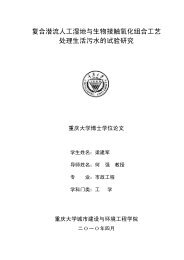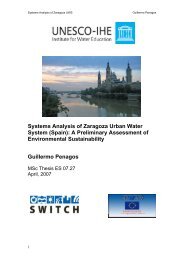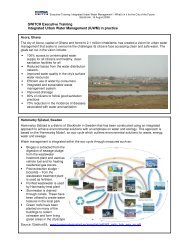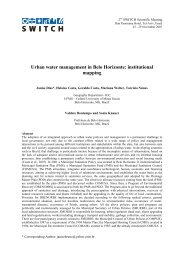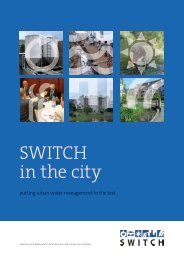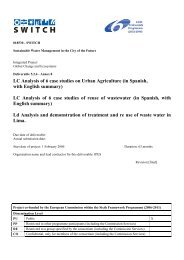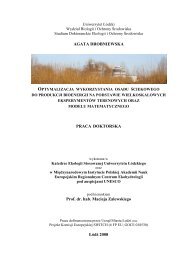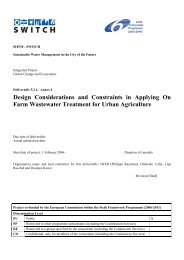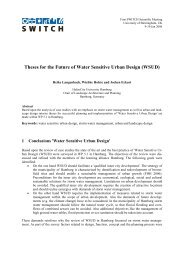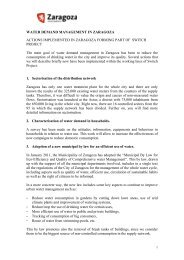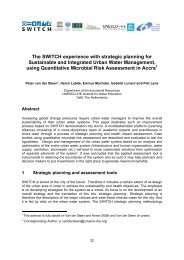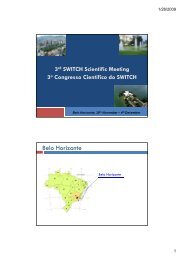Good practices for Social inclusion - Case studies and summary
Good practices for Social inclusion - Case studies and summary
Good practices for Social inclusion - Case studies and summary
You also want an ePaper? Increase the reach of your titles
YUMPU automatically turns print PDFs into web optimized ePapers that Google loves.
people are ‗invited in‘, as could be argued by the UK examples. The outcomes from a<br />
participatory process are clearly unique to its context, but there are specific contextual factors<br />
which enable or constrain progress.<br />
The varying political <strong>and</strong> governance contexts of PB<br />
In Brazil, civil society organisations battled <strong>for</strong> democratic rights against the brutal military<br />
regime in the 70s <strong>and</strong> 80s. The PT (Worker’s Party), (an alliance of community bodies, trade<br />
unions, progressive church leaders <strong>and</strong> intellectuals) which came from this movement gained<br />
power in 1985 74 . A broad range of socio-economic <strong>and</strong> political rights <strong>for</strong> the previously<br />
excluded were embedded in a new constitution the following year <strong>and</strong> an intensely federal<br />
system was established giving greater powers to the state <strong>and</strong> municipal levels. Community<br />
organizations in the alliance influenced the uptake of a participatory style of governing,<br />
including development of PB (Henman, op cit). PB has achieved cross-party support but this<br />
may also be waning. Although success has been variable, it has also encouraged other kinds of<br />
innovation in participatory governance in Brazil, including at the national level (a national<br />
participatory budget plan is under development).<br />
In the UK rather than PB being part of a struggle <strong>for</strong> <strong>inclusion</strong>, PB is more of a conscious ef<strong>for</strong>t by<br />
the authorities to re-engage with the ‘poor’ within existing representative processes (Blakey,<br />
undated). The socio-political realities in which PB is taking place in Latin America <strong>and</strong> the UK<br />
are qualitatively different. In Brazilian cities poverty is more widespread <strong>and</strong> there is a stronger<br />
tradition of collective action compared to the UK, which has mobilized many excluded people<br />
who now seek engagement. In contrast, in the UK, social activism is moving away from the<br />
<strong>for</strong>mal democratic system (Pearce cited by Blakey, p5, undated). Very recently, the UK<br />
government has decided to exp<strong>and</strong> the PB pilots, asking the Community Development<br />
Foundation in 2007 to establish a National Empowerment Partnership, to improve community<br />
engagement in public service provision. There are currently 22 local authority areas in Engl<strong>and</strong> 75<br />
piloting PB, incorporating <strong>and</strong> going beyond the small area-based case <strong>studies</strong> analysed here. A<br />
public consultation is underway on a draft PB plan 76 , which would lead to participatory budgets<br />
being mainstreamed into local authority budgets - every local authority would have to use<br />
participatory budgets by 2012<br />
Box 15 : The varying political <strong>and</strong> governance contexts of PB<br />
Whilst far from perfect, an important element of the Brazilian PB processes, in relation to<br />
social exclusion, is that they institute principles such as redistribution of wealth into the<br />
planning process. At the risk of oversimplification, it has been argued that the processes<br />
within the UK tend to work within the status quo, with the excluded being the ‗problem‘ <strong>and</strong><br />
‗needing attention‘ – rather the democratic structure itself. The emphasis is on ‗re-engaging<br />
the disengaged it the same old system‘, rather than creating more fundamental institutional<br />
change which would give excluded groups greater rights <strong>and</strong> challenge inequities (Blakey,<br />
undated). Broad support <strong>for</strong> radical trans<strong>for</strong>mation of state-society relations is needed <strong>and</strong><br />
the question is how to achieve this.<br />
Although the political context constrains the depth of PB pilots in some situations, it is<br />
possible <strong>for</strong> them to help persuade central government of the benefits of the approach.<br />
74 Henman, O (2007) ‗Participatory Democracy in UK Communities‘.<br />
http://www.makeitanissue.org.uk/2007/07/oli_henman_participatory_democ.php<br />
75 e.g. in Newcastle, Sal<strong>for</strong>d, Brad<strong>for</strong>d <strong>and</strong> Sunderl<strong>and</strong><br />
76 http://www.communities.gov.uk/documents/communities/pdf/727993.pdf<br />
103



